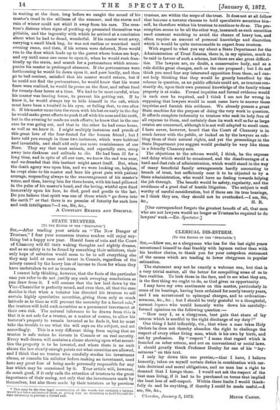CLERICAL DIS-ESTEEM.
[TO THE EDITOR OF THB "SPECTATOR."]
SIR,—Allow me, as a clergyman who has for the last eight years- accustomed himself to deal frankly with laymen rather than witls his brother clerics, to thank you for your outspoken statement of the causes which are tending to lower clergymen in popular estimation.
The statement may not be exactly a welcome one, but that is- a very trivial matter, all the better for compelling some of us to face realities. To look these in the face, and to see what they are, is the first thing we ought to do, as God gives us opportunity.
I may have my own sentiments on this matter, particularly in, some of its bearings, having been ordained for nearly twenty years,. and I am accustomed to episcopal charges, and to ordination- sermons, &c., &c. ; but I should be truly grateful to a thoughtful,. earnest layman who would honestly write down his carefully- formed opinions on the following question:—
"[flow may I, as a clergyman, best gain that share of lay esteem which is needful to the right discharge of my duty ?"
One thing I bold inflexibly, viz., that when a man takes Holy Orders he does not thereby abandon the right to challenge the respect of every other living man, which is his own by birth, and not by profession. By " respect " I mean that regard which is founded on sober esteem, and not on conventional or social laws. I should greatly thank Professor Huxley for one of his " lay- sermons " on this text.
I only lay down this one proviso,—that I have, I believe honestly, taken on myself certain duties in combination with cer- tain doctrinal and moral obligations, and no man boa a right to demand that I forego these. I would not ask the respect of the best man living, if it had to be purchased on terms that implied the least loss of self-respect. Within these limits I would thank- fully do and be anything, if thereby I could be made useful.—I am, Sir, &c.,










































 Previous page
Previous page